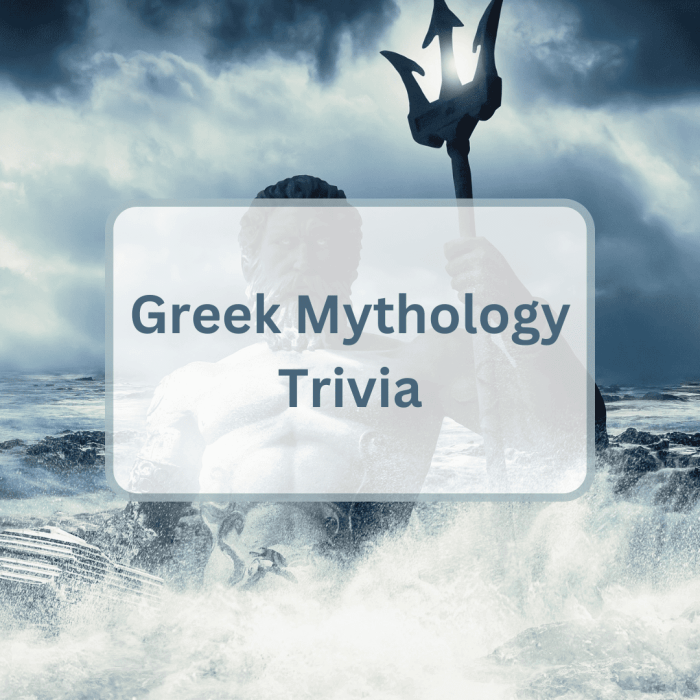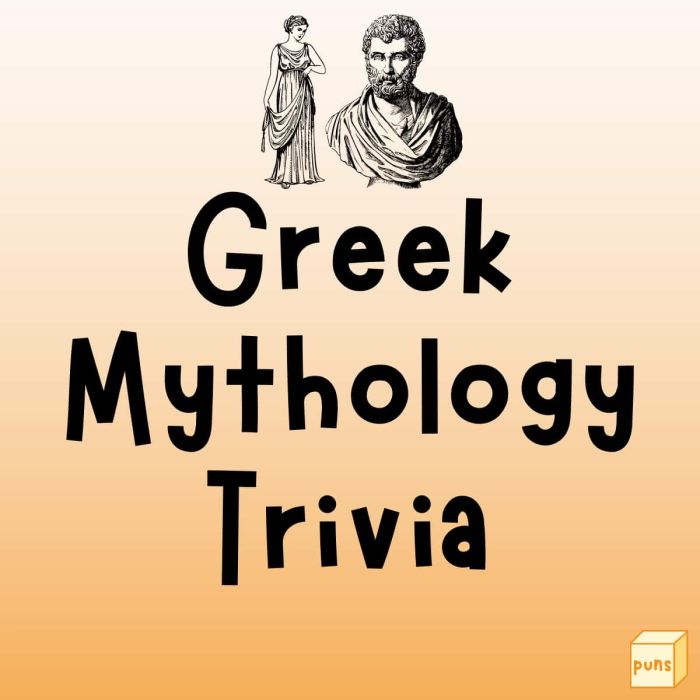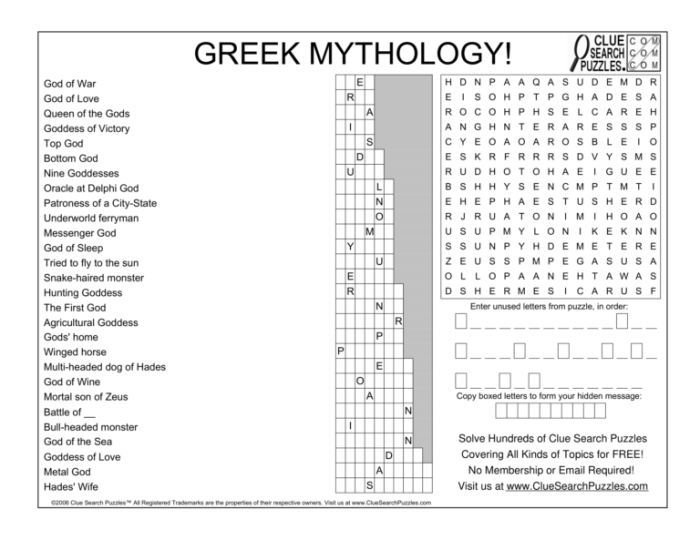Embark on an enthralling journey into the realm of Greek mythology trivia questions and answers. From the enigmatic origins of the gods to the epic quests of heroes, this captivating exploration delves into the depths of a timeless mythology that continues to inspire and intrigue.
Greek mythology trivia not only tests our knowledge but also unveils the profound impact of these ancient tales on our modern understanding of literature, art, and culture. Through engaging questions and insightful answers, we uncover the hidden meanings and enduring relevance of Greek mythology.
Greek Mythology Trivia Questions and Answers

Greek mythology trivia questions and answers are a fun and engaging way to test your knowledge of this fascinating subject. They can also help you to learn more about the gods, goddesses, heroes, and creatures of Greek mythology.
Trivia questions about Greek mythology can be divided into several categories, including:
- The gods and goddesses of Mount Olympus
- The heroes and heroines of Greek mythology
- The creatures and monsters of Greek mythology
- The stories and legends of Greek mythology
The accuracy of trivia questions about Greek mythology can be verified by referring to the original sources, such as the works of Homer, Hesiod, and the Greek tragedians.
Trivia questions about Greek mythology can be used for educational purposes, as well as for entertainment. They can also help to foster cultural appreciation.
Types of Greek Mythology Trivia, Greek mythology trivia questions and answers
There are many different categories of trivia in Greek mythology, including:
- The gods and goddesses of Mount Olympus:This category includes questions about the names, attributes, and relationships of the Olympian gods and goddesses.
- The heroes and heroines of Greek mythology:This category includes questions about the names, deeds, and adventures of the heroes and heroines of Greek mythology.
- The creatures and monsters of Greek mythology:This category includes questions about the names, appearances, and abilities of the creatures and monsters of Greek mythology.
- The stories and legends of Greek mythology:This category includes questions about the plots, characters, and settings of the stories and legends of Greek mythology.
The historical context of each category of Greek mythology trivia is different. The stories and legends of Greek mythology were developed over centuries, and they reflect the beliefs and values of the ancient Greeks.
The methods used to verify the accuracy of Greek mythology trivia vary depending on the category. For example, the names and attributes of the Olympian gods and goddesses can be verified by referring to the works of Homer and Hesiod.
The deeds and adventures of the heroes and heroines of Greek mythology can be verified by referring to the works of the Greek tragedians.
Sources of Greek Mythology Trivia
The primary sources of Greek mythology trivia are the works of Homer, Hesiod, and the Greek tragedians.
- Homer:Homer was a Greek poet who lived in the 8th century BC. He is the author of the Iliad and the Odyssey, two of the most important works of Greek literature. The Iliad tells the story of the Trojan War, while the Odyssey tells the story of Odysseus’s journey home from Troy.
- Hesiod:Hesiod was a Greek poet who lived in the 7th century BC. He is the author of the Theogony, which is a poem about the origins of the gods and goddesses of Greek mythology.
- The Greek tragedians:The Greek tragedians were a group of playwrights who lived in the 5th century BC. They wrote plays about the myths and legends of Greek mythology.
The reliability of these sources is generally considered to be good. However, it is important to remember that these works were written centuries after the events they describe. As a result, they may not be completely accurate.
Scholars use these sources to construct trivia questions about Greek mythology by identifying the key facts and details from the stories and legends. They then use these facts and details to create questions that are both challenging and informative.
Applications of Greek Mythology Trivia
Greek mythology trivia has a number of applications, including:
- Educational value:Greek mythology trivia can be used to teach students about the gods, goddesses, heroes, and creatures of Greek mythology. It can also be used to teach students about the history and culture of ancient Greece.
- Entertainment and pop culture:Greek mythology trivia is often used in entertainment and pop culture, such as in movies, TV shows, and video games. It can also be used in trivia contests and other games.
- Cultural appreciation:Greek mythology trivia can help to foster cultural appreciation by teaching people about the myths and legends of ancient Greece. It can also help people to understand the influence of Greek mythology on Western culture.
Questions and Answers
What is the significance of trivia in Greek mythology?
Trivia in Greek mythology encompasses the vast body of lesser-known details and anecdotes that enrich the tapestry of the myths. These seemingly insignificant details often hold profound meanings, shedding light on the motivations of characters, the origins of events, and the intricate relationships within the divine pantheon.
How has trivia influenced modern interpretations of Greek mythology?
Trivia has played a pivotal role in shaping modern interpretations of Greek mythology. By unearthing obscure details and forgotten stories, scholars and artists have gained a deeper understanding of the original myths. This knowledge has led to fresh perspectives, nuanced interpretations, and a more comprehensive appreciation of the complexities within Greek mythology.


